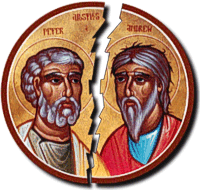Who are the most valuable people in your church?
The senior pastor? The elders? The biggest givers? The talented worship leader? The worship band? The hip youth pastor? The youth? The coordinator for all your volunteers? The volunteers? The visitors?
How about the weak?
Jean Vanier, the founder of L’Arche communities (the worldwide network of communities for people with disabilities), picks up on Paul’s remarks in 1 Corinthians 12 and answers the question this way:
Jesus came to change a world in which those at the top have privilege, power, prestige and money while those at the bottom are seen as useless. Jesus came to create a body. Paul, in 1 Corinthians 12, compares the human body to the body of Christ, and he says that those parts of the body that are the weakest and the least presentable are indispensable to the body. In other words, people who are the weakest and least presentable are indispensable to the church. I have never seen this as the first line of a book on [the church]. Who really believes it? But this is the heart of faith, of what it means to be the church. Do we really believe that the weakest, the least presentable, those we hide away—that they are indispensable? If that was our vision of the church, it would change many things (Living Gently in a Violent World, 74).
Why?
We are terrified of our weakness. So we hide it, and are thus incapable of moving toward God and others as we actually are: weak and ultimately dependent creatures who flourish in relationship with God and others. We’d rather pretend we’re strong. We’d rather avoid facing our weakness.
But as we live among those whose weaknesses are more apparent, more public than our own—particularly those with disabilities but also the poor—then we are confronted not just with their reality but with our reality.
We would rather avoid all that. We’d rather present ourselves as strong, capable, in control, thank you very much. Don’t get me—or Vanier—wrong, for we certainly are amazing beings, all of us, even those whose weaknesses are most apparent. As Gilbert Meilaender says, we are beautiful juxtapositions of freedom and finitude. It’s our finitude we fear, so we hide it. But when the finitude (weakness) of another confronts us, we are reminded of our own. We are reminded who we really are.
That’s why those whose weaknesses are most apparent are in fact the most valuable in the church. Those who are least presentable. Those we hide away. From Vanier’s standpoint, their weakness helps us face our own weakness and to move toward God and others as we really are.
It makes you think about your church, doesn’t it? Who are the ones hidden away? Who are the least presentable? Who are those whose weakness makes the rest of us uncomfortable? Who are those who confront us with ourselves?












 In chapter two, Healy addresses what he calls “blueprint ecclesiologies.” His vision for ecclesiology is that it “can aid the church’s efforts by reflecting theologically upon its concrete identity” (25). Healy moves on to focus on what he considers the ecclesiological styles of the last century: 1) an attempt to encapsulate in a single word or phrase the most essential characteristic of the church; 2) construing the church as having a bipartite structure; 3) these last two elements are combined into a systematic and theoretical form of normative ecclesiology; 4) a tendency to relfect upon the church in abstraction from its concrete identity; and 5) a tendency to present idealized accounts of the church (26).
In chapter two, Healy addresses what he calls “blueprint ecclesiologies.” His vision for ecclesiology is that it “can aid the church’s efforts by reflecting theologically upon its concrete identity” (25). Healy moves on to focus on what he considers the ecclesiological styles of the last century: 1) an attempt to encapsulate in a single word or phrase the most essential characteristic of the church; 2) construing the church as having a bipartite structure; 3) these last two elements are combined into a systematic and theoretical form of normative ecclesiology; 4) a tendency to relfect upon the church in abstraction from its concrete identity; and 5) a tendency to present idealized accounts of the church (26). Nicholas M. Healy’s book,
Nicholas M. Healy’s book,